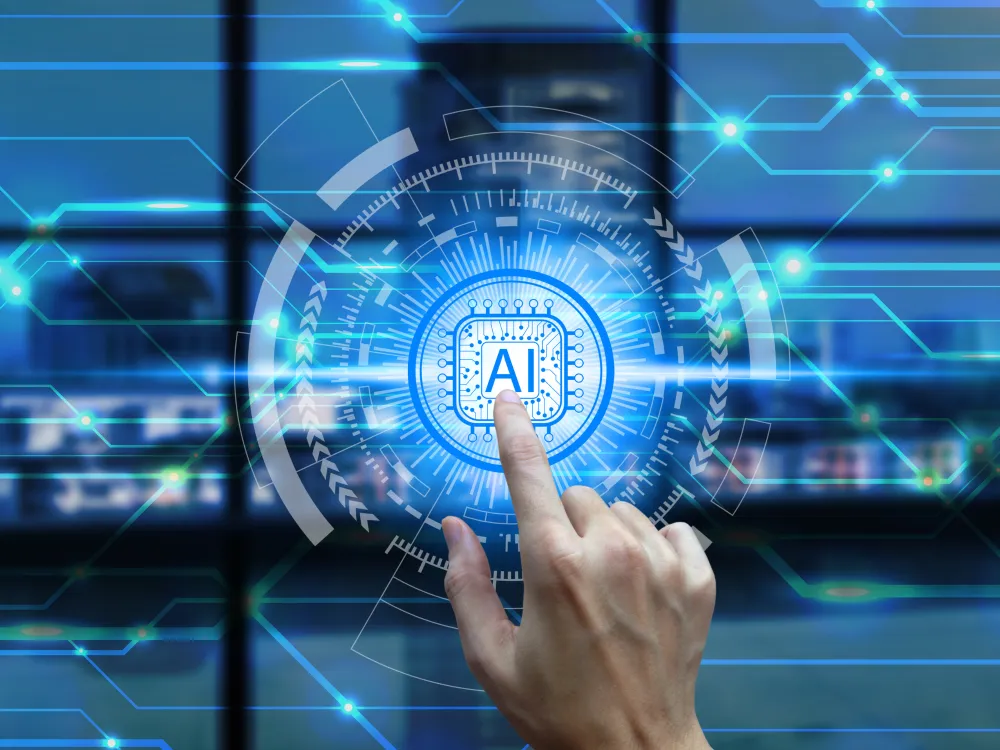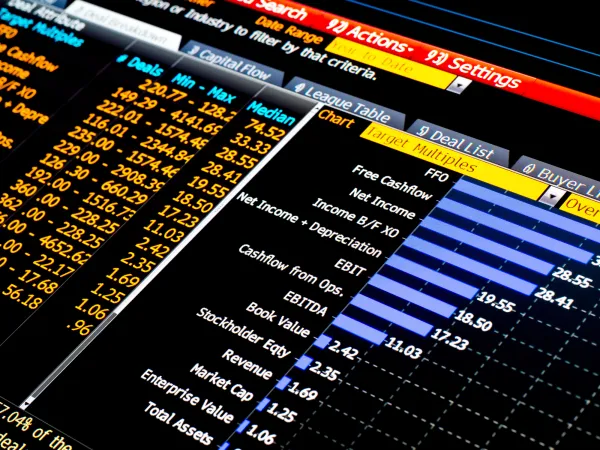
A hand reaching out to a glowing AI chip icon surrounded by blue digital circuits and technology elements, symbolizing innovation.
AI in business economics and analytics: cost reduction and smarter decision-making through automation
Artificial intelligence (AI) is revolutionizing businesses, creating new cost and efficiency gains. AI is a powerful tool for businesses seeking to remain competitive in our fast-paced world because it can automate mundane chores, optimize resource utilization, and improve data usage.
We will discuss how to use AI in your business from automating repetitive tasks, using advanced analytics to inform decision-making, and implementing intelligent solutions to solve real-world industry challenges across sectors. For instance, Lemberg Solutions demonstrated the use of AI in Data analytics to improve their business operations. We also give examples of how AI increases efficiency and productivity in the business world.
AI in business economics: how automation reduces costs
One of the key benefits of AI in business economics is how it helps to drive down cost and maximize resources. This is done through automating many routine tasks, making far more accurate forecasts, and minimizing human intervention in its business processes.
Let robots handle the work.
For instance, your company can automate repetitive and labor-intensive processes. Programs such as QuickBooks AI or Xero automatically generate financial reports and monitor costs and revenues, thus reducing labor in the field of finances and accelerating the pace of the accounting department’s work. In the same way, AI-powered robots deployed on production lines help reduce labor costs, as well as increase the quality and speed of production.
AI minimizes risks.
Human error is a common cause of loss. For instance, DHL employs AI for automatic route planning to minimize delays and reduce fuel costs. AI algorithms can evaluate risks at a high level of accuracy in the insurance sector and avoid financial loss due to incorrect assessments.
Cut costs and manage resources. AI also helps businesses optimize their resources, minimizing wastage, and cutting costs. Demand analytics tools identify the products that need to be moved, so inventory levels can be optimized and storage costs reduced. In agriculture, solutions such as the John Deere Operations Center help farmers to be more effective in applying fertilizers, seeds, and water, as well as in reducing costs and boosting yields.
Make your customers happy.
Using AI in business analytics also reduces customer service costs by automating standard queries. For example, in the e-commerce industry, chatbots can respond to customers 24/7, answering questions on behalf of an operator. This allows companies to save on hiring and staffing expenses.
Organizations now understand the importance of implementing AI in business processes, which includes improving productivity, lowering costs, and fast-tracking innovation efforts. So basically, any company wanting to keep pace in the current dynamic market must have AI as its best friend.
Economics of AI and Business
AI in business economics is not just about technology any longer. Rather, it’s about the need for businesses to be flexible, able to adapt to changes and have an adequate level of resource management, succession, and longevity. Its deployment enables enterprises to ramp up, innovate, and maintain a leading edge in your market.
Let’s discuss how AI is integrated into business economics and how it brings down the cost.
Repetitive Task Automation
Thanks to AI, companies are able to automate everyday and repetitive processes, reducing the use of manpower and, therefore, costs. While humans require downtime, AI can work around the clock and will not tire or have lapses in performance. Automation is already deployed in corporate operations, from finance departments to marketing and production.
Inventory Management
AI algorithms help to quickly analyze large volume data and find risks or anomalies that humans can easily miss. The experience of AI in business analytics has already been fully utilized in the retail sector to analyze data such as demand, sales, and current stocks. Essentially, the usage of artificial intelligence systems —in particular, the ones in Amazon warehouses— is critical for the automation of tasks like sorting and transporting goods, which results in significant reductions in staff expenses.
Document Processing & Customer Service Automation
How many operators would you need to provide 24-hour customer service, and how much would it cost your company? AI-enabled chatbots are capable of handling standard queries without an agent and lowering support costs. Also, tools that automatically process invoices, contracts, and other documents help save valuable time for legal and financial professionals. AI is already working its magic in this area. With the help of AI, businesses can analyze market data in real-time for a quick response to any changes. This is especially important in sectors like retail, finance, or manufacturing where time is money.
Energy Consumption Management and Network Optimization
AI collects data patterns that are utilized in monitoring and automatically regulating consumption to reduce energy expenditure. To illustrate; Siemens uses AI to optimize equipment energy consumption, resulting in electricity costs reduced by as much as 20%. General Electric uses AI to optimize industrial equipment and reduce energy consumption by 15 to 20 percent. UPS uses AI in logistics to optimize delivery routes, reducing fuel costs and environmental impact. Systems that manage smart buildings are also capable of controlling lights and heating of the buildings when not occupied thus further reducing energy consumption. Such solutions indeed help cut down on the cost, but come hand in hand with sustainable development.
AI in business analytics: smarter solutions for companies
Machine learning provides AI with the ability to identify hidden patterns in data that would be impossible using conventional methods. It allows for more efficient processing of large amounts of data, more accurate results, as well as better decision-making. Also, AI’s benefits in business analytics can help corporations with automatic decision-making, enabling data-driven decisions in which AI will provide them opportunities to subscribe to information on a daily basis.
Companies can use machine learning programs to analyze historical data and predict what will sell in the future. This prevents companies from producing too much or buying too much. For example, Walmart uses artificial intelligence to forecast product demand by utilizing weather patterns and community events.
AI can help companies better understand their customers to fine-tune and shape their business strategies. The algorithms Netflix uses to customize recommendations, for instance, keep customers from churning, which means more revenue for the company.
AI analyzing large data is another unique area where AI can be extremely useful. This is especially important in the financial industry to identify threats or fraud, just as PayPal does.
AI as a Game-Changer for Business Efficiency and Growth
Artificial intelligence, AI, is becoming a core element of change in how businesses now operate. AI cuts costs through automated processes, resource optimization, and productivity boosts, enhancing economic performance. AI also helps companies make better decisions by providing better forecasting, customer behavior analysis, and efficient risk management.
The outlook for AI in business economics and analytics is still very much wide. With technology becoming increasingly accessible every year, AI is also becoming increasingly available to even the smallest of enterprises. Looking ahead, advancements will further deepen the role of automation in business processes, enable new solutions for the circular economy, improve ecological sustainability, and reinforce the global competitiveness of companies.
There are unlimited opportunities if you are asking how to use AI in business. Businesses can apply AI to automate certain processes, manage stock more efficiently, use chatbots for customer interaction, and mine huge datasets to predict trends and mitigate risk. AI is also reducing energy costs, optimizing supply chains, taking personalization in customer experiences to the next level, and fueling efficiency and innovation at scale across industries.


